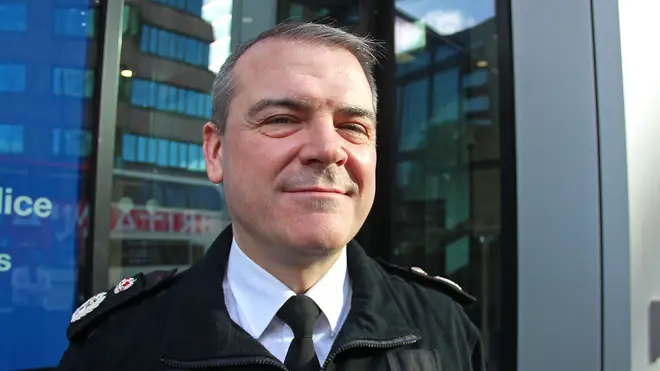
Matthew Wright 7am - 10am
16 June 2020, 15:24

The chief constable of England's second largest police force has apologised to the black community for historic wrongs by its officers.
David Thompson, who leads West Midlands Police, said: "Our own history of policing is also marked out by discrimination and I wanted to acknowledge that."
He was speaking as concerns about racism have triggered demonstrations around the world, following the death of George Floyd in the United States after his restraint by police officers.
In wide-ranging comments during a strategic police board meeting on Tuesday, Mr Thompson also supported his officers "taking a knee" in solidarity with anti-racism campaigners and promised action against anyone caught damaging statues.
Cataloguing historic failings by police, he said: "Treatment of new migrant communities in the 1950s, the 'sus law', the riots of the 1980s, the death of Stephen Lawrence, many of those issues have played out here also in the West Midlands.
"Particularly, if you look back on our history, the scandals of the serious crime squad had clear issues about race.
A message from Chief Constable Dave Thompson - https://t.co/dCOFjiTRVJ
— Dave Thompson (@DaveThompsonCC) June 16, 2020
"I want to start off our discussions by apologising for the things West Midlands Police has got wrong over the years, in policing.
"History has created, for some, a narrative that we're not to be trusted and I deeply regret that."
He added: "It's not just about the past, I recognise we are not a service free from bias, discrimination or, on occasions, even racism.
"We reflect this imperfect society."
He said that "I and we, the police service in the West Midlands have more to do".
Mr Thompson added the black community also "had a choice" and called for more black women and men to join up.

"Police officers kneeling during anti-racism protests are vulnerable"
"If you want something different you need to stand forward, I don't want history to trap us," he said.
In recent days, police officers in London sparked debate after "taking the knee" at a Black Lives Matter demonstration.
The gesture emerged in the US in 2016 when sports stars started kneeling during the country's anthem, to protest police brutality and racism.
Answering a question from the public on whether such actions were a breach of his police officers' oaths of service, Mr Thompson said: "The current protests are about racism.
"I'm afraid racism is not an issue on which the force can be impartial.
"With regards to taking the knee, that has evolved as a symbol.
"Many people view it as political, many people view it as a widespread statement demonstrating commitment to anti-racism.
"The position in West Midlands Police we have taken is this: there are some circumstances where it might not be the most sensible thing to do when we're dealing with large crowds and groups.
"In that scenario it may be incredibly challenging to do our jobs.
"There are other circumstances where it may be entirely the right thing that captures the sentiment of crowds."
He added officers and staff had been given the "individual choice" as to whether they think it is appropriate or not to do.
"I don't think, if an officer does this, in the circumstances, they breach their oath at all," said Mr Thompson.
A question from an unnamed retired officer asked whether the force would "use force" to protect statutes like those of Sir Robert Peel, outside West Midlands Police's Birmingham training centre, "or cower away like in Bristol and London".
Mr Thompson said there had been "an interesting debate" in society on which historical figures are celebrated.
He added: "What is not acceptable is tearing down and damaging statues, those are issues of criminal damage, and they are issues the force would pursue and deal with."
Mr Thompson would not comment directly on the policing in Bristol, but said: "On occasions police has been trying to strike the balance between managing public order, not aggravating public disorder."
"That is not unusual," he said.